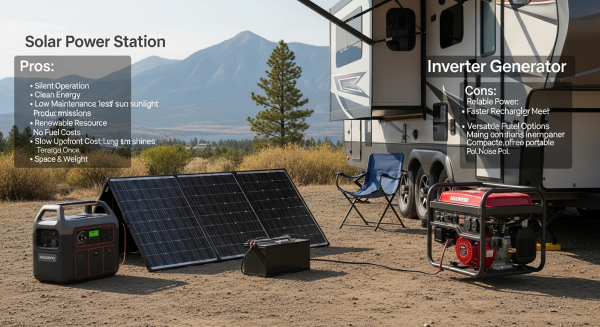
Solar Emergency Charger has released a guide comparing solar power stations and inverter generators for camping and RV use. The article examines differences in safety, noise, cost, power output, and environmental impact to help users choose a solution.

— Solar Emergency Charger has published a new guide for RV and camping enthusiasts. The article offers a detailed comparison of solar power stations and inverter generators, helping users determine the most suitable option for their off-grid power needs.
More information is available at https://solaremergencycharger.com/
The primary distinction between these power sources lies in their operation. Inverter generators produce electricity by burning fuel like gasoline or propane. Conversely, portable power stations are large batteries that store energy from sources such as solar panels or wall outlets for later use.
This operational difference affects safety and where the units can be used. Generators produce toxic emissions like carbon monoxide from burning fuel, restricting them to outdoor use away from enclosed areas. In contrast, power stations produce no emissions during operation, making them safe for use inside an RV or tent.
Noise level is a significant consideration, particularly in shared campgrounds. Portable power stations generally operate between 20 and 50 decibels, which is quieter than a typical conversation. As many campgrounds enforce noise limits under 60 decibels, the quieter operation of power stations makes them a compliant choice.
The financial investment for each option varies. Generators typically have a lower initial cost, from several hundred to a few thousand dollars. A complete solar setup for an RV, including panels and batteries, requires a larger upfront investment. However, solar power eliminates ongoing fuel costs, potentially leading to long-term savings.
Power output and reliability differ between the two. An inverter generator can power heavy appliances in any weather, making it suitable for high-demand situations. Solar power stations are generally better for light to moderate energy needs, as their recharging capability depends on available sunlight.
For many outdoor enthusiasts, environmental impact is a key factor. Because they are quiet and produce no operational emissions, power stations help preserve the tranquility of natural settings. While their manufacturing and charging source have an environmental footprint, their use is cleaner than fuel-burning alternatives.
The best choice depends on individual priorities. Power requirements, budget, noise restrictions, and environmental concerns all influence the decision. The new guide helps consumers weigh these variables to make an informed choice.
To read the complete comparison, please visit the Solar Emergency Charger website at https://solaremergencycharger.com/.
Contact Info:
Name: Tim Jenkins
Email: Send Email
Organization: Solar Emergency Charger
Address: P.O. Box 339, Myrtle Beach, NY 29588, United States
Website: https://solaremergencycharger.com/
Source: PressCable
Release ID: 89170914
If you detect any issues, problems, or errors in this press release content, kindly contact [email protected] to notify us (it is important to note that this email is the authorized channel for such matters, sending multiple emails to multiple addresses does not necessarily help expedite your request). We will respond and rectify the situation in the next 8 hours.


